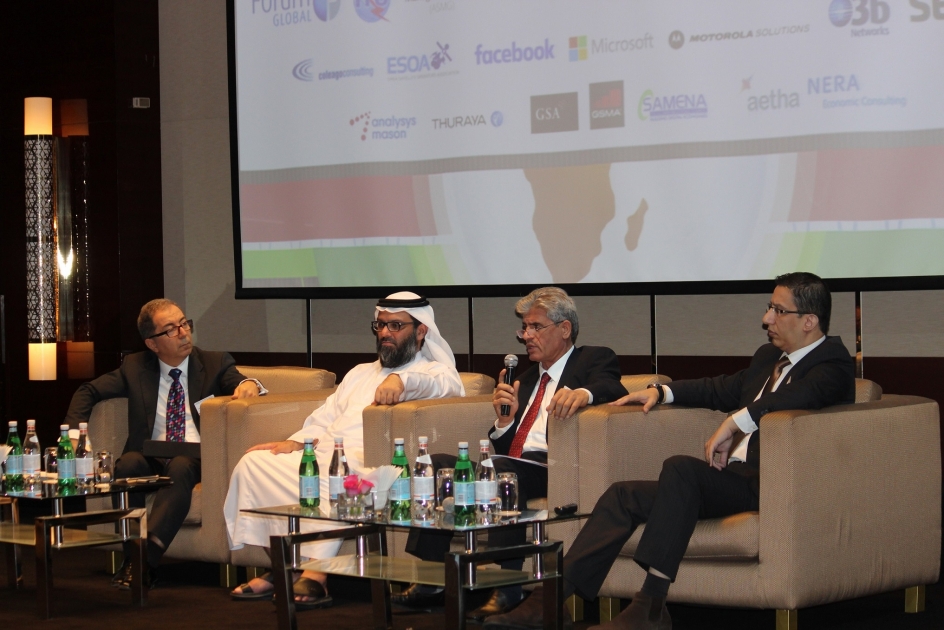
SAMENA Council Moderates Spectrum Management Regulatory Roundtable with Government Institutions
SAMENA Telecommunications Council, the tri-regional, non-profit telecommunications industry association that embodies a community of South Asian, Middle Eastern, and North African telecoms operators, manufacturers, and specialist ICT firms, moderated a regulatory roundtable on spectrum management at the 3rd Annual MENA Spectrum Management Conference held in Dubai on 24 - 25 January. The conference, which was hosted by Telecommunications Regulatory Authority (TRA) in United Arab Emirates, is a part of the Global Spectrum Series – the world’s largest collection of regional spectrum management events.
The main purpose of the regulatory roundtable was to bring together key regulators from within the Arab region to provide an overview of the decision making processes and spectrum allocation plans for the future, including methods used for allocating spectrum, pricing methodologies, and overall governance of the spectrum. Spectrum management for the next-generation of mobile broadband is among the key priority areas that SAMENA Council views as being critical among other emerging sustainability challenges for the telecoms and ICT industry. It emphasizes the need for transparent dialogue, visibility and predictability in decision-making, and enhancing common understanding of perspectives across stakeholders.
SAMENA Council's member operators, in general, believe that certain frequency bands are highly important to industry-wide efforts for 5G development. Given the socio-economic benefits associated with certain bands, which are of strategic interest across the communications space among multiple stakeholders, it is imperative to consider multiple views and achieve transparent considerations prior to taking any decisive policy and regulator steps.
Moderation of this important regulatory activity during the MENA Spectrum Management Conference has helped re-enforce the multi-stakeholder imperative of open communication and private-public sector engagement on policy matters. Key questions asked to the government representatives of the UAE, Qatar, and Egypt by SAMENA Council ensured clarity on regulatory plans. Insights into spectrum distribution mechanisms and the use of spectrum allocation formulae, future spectrum allocation and preparatory work for 5G, spectrum re-farming after phasing out older technologies, and balancing stakeholder requirements and priorities on spectrum and related fronts were gained in the presence of an audience of 200-plus industry professionals and senior executives.
Mustafa Aykut, head of regulatory and policy activities at SAMENA Council, as the moderator of the Roundtable, commented, "Challenges associated with spectrum management and planning are of extreme importance to telecom operators, and to all public and private-sector ICT players, to be able to maximize the overall benefit that could be derived from the required spectrum, allocated at the required time. This helps in achieving a balance between regulatory rules and the market's dynamics is of urgency for all of us. Upcoming developments in 5G will stimulate new investment and encourage stakeholders to work together in the new data-driven economy. The sooner we engage in working together on high-priority areas such as spectrum, the more time we will have to concentrate on harnessing the power of 5G for the common end-user and for meeting the Sustainable Development Goals."
In harmony with other likeminded industry associations, SAMENA Council believes that 5G's true potential, and to what extent that potential could, and should, be realized, primarily rests in the hands of governments and regulatory authorities. WRC-19, a key event that the communication industry is anxiously awaiting, presents a good opportunity to reach agreements on key frequencies, defined across the industry to realize efficient socio-economic benefits and to accelerate 5G development. To enable all communications players, across the terrestrial and satellite space, to contribute to 5G, develop low-cost devices, and mitigate cross-border frequency interference, harmonized spectrum allocation efforts are critically required. Delay or failure to reach consensus on the requirements for a sustainable digital future in this regard could jeopardize 5G development and ubiquitous access that it promises.
The MENA Spectrum Management conference has outlined the major points from various angles two years ahead of WRC-19. The clarity provided by the participating regulatory authorities should give the private-sector of this region the confidence that governments are indeed aware of the needs and the challenges on the spectrum front. To this effect, SAMENA Council will maintain its engagement on spectrum management issues throughout the SAMENA region, working closely with regulatory bodies; pursuing the cause of building digital economies by facilitating effective and prompt communication between telecom operators and government institutions.


























